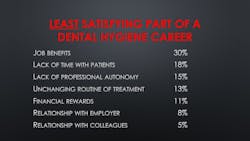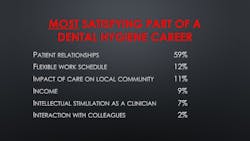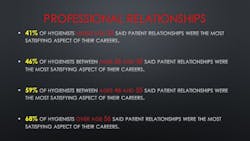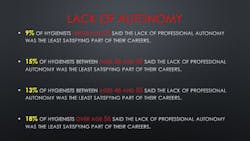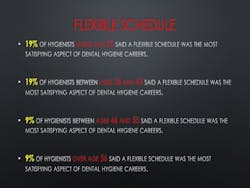Most dental hygienists find that the person in the operatory with them is the most satisfying aspect of their careers, but there’s a mixed reaction to what’s the least satisfying factor in a dental hygiene career, according to a survey conducted by RDH eVillage.
Their relationships with patients was deemed the “most satisfying” part of their career by 59% of the 2,117 dental hygienists who participated in the February 2017 survey.
“I like my time with patients and I like dentistry in general,” said a Pennsylvania dental hygienist. “I give 100% and would like to be appreciated financially in some way. It would make coming to work much more fun.”
---------------------------------------
Previously published articles from the Career Satisfaction survey
- What role does burnout play in dental hygiene?
- Staying positive, most dental hygienists remain bullish about their profession
---------------------------------------
As implied, this particular hygienist cited the lack of financial rewards as being the least satisfying part of a dental hygiene career. The list of “least” satisfying aspects was not dominated by any one answer, but the lack of employee benefits led the pack with 30%.
An Arizona hygienist commented, “The doctor dropped a bomb on the staff. My vacation (nine days) and holidays (seven days) were taken away. We now have a new paid time off (PTO) policy in place. One PTO hour for 30 hours worked. I have always been so proud to work in an office that provides benefits. They claim the hygiene department is not producing. The numbers tell a different story. I'm not a tree! I can move on!”
A little over 20% of the hygienists reported that the flexible work schedules common to the profession and the impact of care on the local community were the most satisfying aspects of their careers.
Interestingly, the strong value placed on relationships with patients increases as dental hygienists get older.
“The difficulty I see in today's climate is the fact that we have so many corporate-style dental clinics moving into the area, which doesn't sit well with me,” said a Florida dental hygienist in the 46- to 55-year-old age bracket. “They may pay well, but the moral and ethical compass is missing. Patients are just a number and very often, unwarranted procedures are completed. Everyday, I love going to work! There is no such thing as a dreaded Monday in my book.”
Older hygienists, though, are more likely to be bothered by the lack of autonomy for the profession—at least to the point where it is the least satisfying part of a dental hygiene career. A veteran Michigan hygienist said, “I feel our profession is held back by the doctors, and we are not respected as the professionals we are.”
On the other hand, hygienists with perhaps a greater degree of child-rearing responsibilities placed the greatest value on the flexible work schedules offered to dental hygienists. But not necessarily. A New Jersey dental hygienist under age 35 said, “I love hygiene but if I had the chance to change fields I might just do it in order to have new experiences in life, not because of dissatisfaction.” A younger Pennsylvania hygienist enjoys the flexible hours due to her other job: “The only reason I keep from burning out is because I have a second job that's more creative.”
The survey also examined the most and least favored parts of dental hygiene based on work settings. Dental hygienists who worked in small solo practices tended to differ with their peers in public health dentistry in these areas:
- Hygienists in small solo practices tend to be disheartened by three times as much about the lack of employee benefits (35% to 9%).
A hygienist in a small practice in Missouri said that, due to occupational injuries, retirement would come earlier for her than anticipated. She added, “I will have to retire before being able to access retirement money without penalty. No benefits, outside of being able to self-fund a SIMPLE IRA. I made a poor career choice.”
- Public health dental hygienists were three times more likely to be unsatisfied by the lack of autonomy than hygienists in solo practices (30% to 11%).
A public health dental hygienist in Georgia wrote, “My home state has just passed general supervision for dental hygienists! Did not think it could happen in my lifetime.”
- Dental hygienists in small or group practices were much more likely to say patient relationships are the most satisfying thing about their careers (more than 60% in both work settings) than public health hygienists (26%).
A dental hygienist in a Kentucky solo practice wrote, “I still love my work and time with the patients. It is the job around me that has changed. Dentistry has become profit driven, and it is not based on what is best for the patient.“
- Public health hygienists place far greater value on the “impact of care” on a community (53%) than hygienists in solo practices (6%).
A public health hygienist in Ohio observed, “I feel the lack of standardized measures for oral health improvement leads to hygienists’ performance being solely judged on monetary production. Since no one is tracking improvement in perio probe depths, reduction in caries or restoration rates, reduction in tooth years lost, etc., it is often difficult for hygienists to measure their successes and quantify the impact of their hard work or clinical excellency.
“With no benchmark treatment outcome goals to strive for, only ‘production goals,’ where is the motivation to provide the most clinically excellent service? The medical profession tracks BPs, HBa1cs, and other health indicators to see if they are doing a good job. How do we know if dental care providers are doing a good job?”

